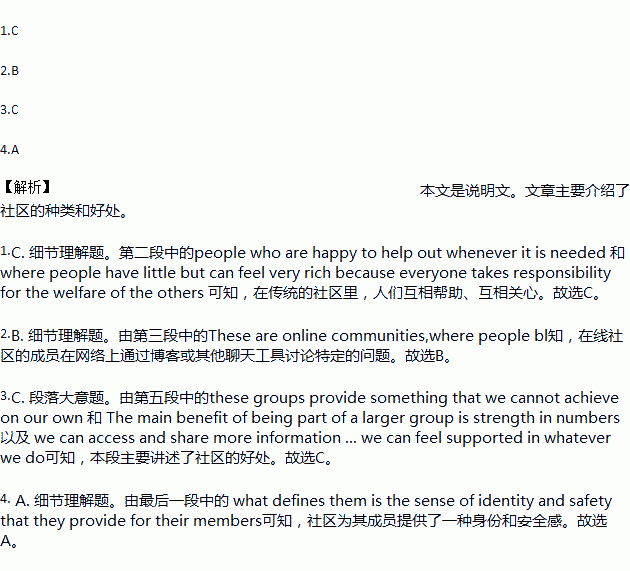题目内容
“Community” is not a concept that is easy to define (定义) . In this essay I will examine what turns individuals into a community, and discuss some different types. I will also look at what all communities have in common, the benefits they offer and draw conclusions about their increasing importance.
The word “community” may make you think of traditional communities in the developing world, where large families live together. We may also imagine the neighbours as people who are happy to help out whenever it is needed. The stereotpical(老套的) view is that of a village, where people have little but can feel very rich because everyone takes responsibility for the welfare of the others.
On the other hand, there are other types of communities: ultramodern(超现代的) ones, where the community members are unlikely to have actually met each other. These are online communities, where people blog or chat about particular issues that are important to them. They come across others on websites and may develop a relationship there with like-minded people, discussing the same topics. The view is often that these are artificial connections between people who are, in effect, still isolated(孤立的) strangers.
In reality, the connections are real. Moreover, there are many types of communities in between these extremes: people who join clubs, who sign up with voluntary, political or other organizations, or who take part in group discussions in their local area. They may be campaigning about issues or simply getting together for companionship and support.
Human beings are social by nature, so it should not be a surprise that we organize ourselves in groups. However, there is more going on: these groups provide something that we cannot achieve on our own. The main benefit of being part of a larger group is strength in numbers. For example, we can access and share more information, we can take part in team sports, we can complain and campaign more effectively and even if we are just having a chat, online or in person, we can feel supported in whatever we do.
Whatever forms communities take, what defines them is the sense of identity and safety that they provide for their members: the knowledge that there are people who we have something in common with and who can be relied on when we need each other.
1.In traditional communities, people_________.
A. live in a large family
B. are wealthy but unhappy
C. help and care about each other
D. are isolated and don't have connections
2.According to the text, online community members_________ .
A. develop a close working relationship
B. share opinions about issues on websites
C. communicate with each other in person
D. share the same interest but have no relations
3.Paragraph 5 mainly talks about___________.
A. the types of community
B. the culture of community
C. the benefits of community
D. the definition of community
4.Communities provide their members with___________.
A. a sense of identity and safety
B. a sense of social responsibility
C. chances of meeting new people
D. chances of developing their interests

